Tuvalu - TV - TUV - TUV - Australia and Oceania
Last updated: January 18, 2026
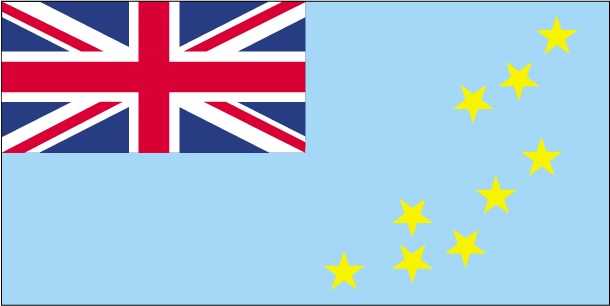
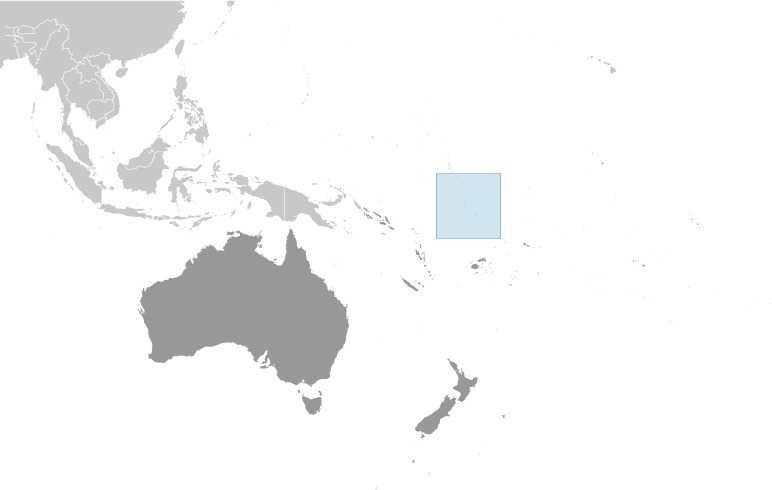
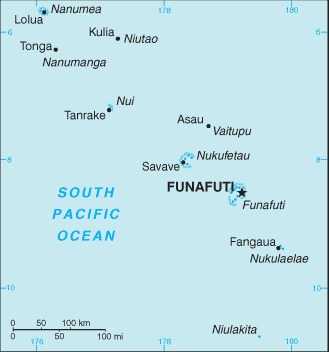
Tuvalu Images
Tuvalu Factbook Data
Diplomatic representation from the US
embassy: the US does not have an embassy in Tuvalu; the US Ambassador to Fiji is accredited to Tuvalu
Age structure
0-14 years: 29.2% (male 1,754/female 1,672)
15-64 years: 63.2% (male 3,736/female 3,675)
65 years and over: 7.6% (2024 est.) (male 326/female 570)
15-64 years: 63.2% (male 3,736/female 3,675)
65 years and over: 7.6% (2024 est.) (male 326/female 570)
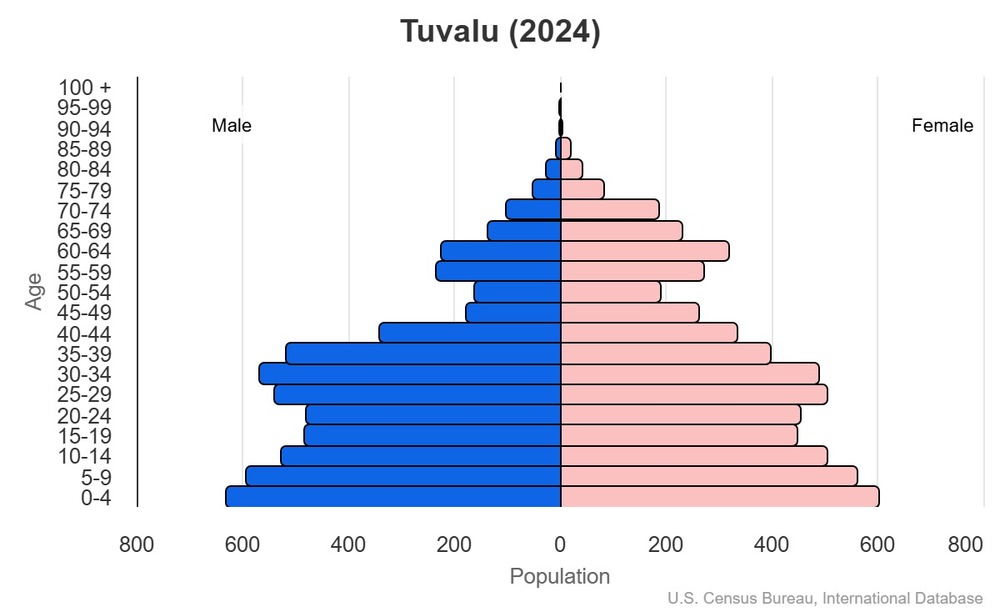
This is the population pyramid for Tuvalu. A population pyramid illustrates the age and sex structure of a country's population and may provide insights about political and social stability, as well as economic development. The population is distributed along the horizontal axis, with males shown on the left and females on the right. The male and female populations are broken down into 5-year age groups represented as horizontal bars along the vertical axis, with the youngest age groups at the bottom and the oldest at the top. The shape of the population pyramid gradually evolves over time based on fertility, mortality, and international migration trends.
For additional information, please see the entry for Population pyramid on the Definitions and Notes page.
For additional information, please see the entry for Population pyramid on the Definitions and Notes page.
Geographic coordinates
8 00 S, 178 00 E
Sex ratio
at birth: 1.05 male(s)/female
0-14 years: 1.05 male(s)/female
15-64 years: 1.02 male(s)/female
65 years and over: 0.57 male(s)/female
total population: 0.98 male(s)/female (2024 est.)
0-14 years: 1.05 male(s)/female
15-64 years: 1.02 male(s)/female
65 years and over: 0.57 male(s)/female
total population: 0.98 male(s)/female (2024 est.)
Natural hazards
severe tropical storms are usually rare, but in 1997 there were three cyclones; low levels of islands make them sensitive to changes in sea level
Area - comparative
about the size of Washington, D.C.
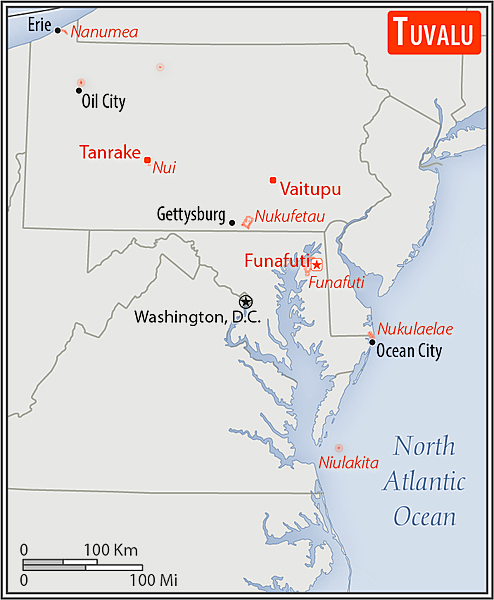
0.1 times the size of Washington, DC
Background
Voyagers from either Samoa or Tonga first populated Tuvalu in the first millennium A.D., and the islands provided a stepping-stone for various Polynesian communities that subsequently settled in Melanesia and Micronesia. Tuvalu eventually came under Samoan and Tongan spheres of influence, although proximity to Micronesia allowed some Micronesian communities to flourish in Tuvalu, in particular on Nui Atoll. In the late 1700s and early 1800s, a series of American, British, Dutch, and Russian ships visited the islands, which were named the Ellice Islands in 1819.
The UK declared a protectorate over islands in 1892 and merged them with the Micronesian Gilbert Islands. The Gilbert and Ellice Islands Protectorate became a colony in 1916. During World War II, the US set up military bases on a few islands, and in 1943, after Japan captured many of the northern Gilbert Islands, the UK transferred administration of the colony southward to Funafuti. After the war, Tarawa in the Gilbert Islands was once again made the colony’s capital, and the center of power was firmly in the Gilbert Islands, including the colony’s only secondary school. Amid growing tensions with the Gilbertese, Tuvaluans voted to secede from the colony in 1974, were granted self-rule in 1975, and gained independence in 1978 as Tuvalu. In 1979, the US relinquished its claims to the Tuvaluan islands in a treaty of friendship.
The UK declared a protectorate over islands in 1892 and merged them with the Micronesian Gilbert Islands. The Gilbert and Ellice Islands Protectorate became a colony in 1916. During World War II, the US set up military bases on a few islands, and in 1943, after Japan captured many of the northern Gilbert Islands, the UK transferred administration of the colony southward to Funafuti. After the war, Tarawa in the Gilbert Islands was once again made the colony’s capital, and the center of power was firmly in the Gilbert Islands, including the colony’s only secondary school. Amid growing tensions with the Gilbertese, Tuvaluans voted to secede from the colony in 1974, were granted self-rule in 1975, and gained independence in 1978 as Tuvalu. In 1979, the US relinquished its claims to the Tuvaluan islands in a treaty of friendship.
Environmental issues
limited freshwater resources; beach erosion; deforestation; damage to coral reefs; rising sea levels
International environmental agreements
party to: Biodiversity, Climate Change, Climate Change-Kyoto Protocol, Climate Change-Paris Agreement, Desertification, Hazardous Wastes, Law of the Sea, Ozone Layer Protection, Ship Pollution, Whaling
signed, but not ratified: Comprehensive Nuclear Test Ban
signed, but not ratified: Comprehensive Nuclear Test Ban
Exports - commodities
fish (2023)
note: top export commodities based on value in dollars over $500,000
note: top export commodities based on value in dollars over $500,000
Exports - partners
Thailand 88%, Japan 6%, Philippines 3%, Ireland 1%, USA 1% (2023)
note: top five export partners based on percentage share of exports
note: top five export partners based on percentage share of exports
Administrative divisions
7 island councils and 1 town council*; Funafuti*, Nanumaga, Nanumea, Niutao, Nui, Nukufetau, Nukulaelae, Vaitupu
Agricultural products
coconuts, vegetables, tropical fruits, bananas, root vegetables, pork, chicken, eggs, pork fat, pork offal (2023)
note: top ten agricultural products based on tonnage
note: top ten agricultural products based on tonnage
Military and security forces
no regular military forces; Tuvalu Police Force
Budget
revenues: $87 million (2019 est.)
expenditures: $88 million (2019 est.)
note: revenue data include Official Development Assistance from Australia
expenditures: $88 million (2019 est.)
note: revenue data include Official Development Assistance from Australia
Capital
name: Funafuti
geographic coordinates: 8 31 S, 179 13 E
time difference: UTC+12 (17 hours ahead of Washington, DC, during Standard Time)
etymology: the town has the same name as the island it is located on; the name may either come from the Polynesian word futi (banana) or the name Futi, one of the wives of a local ruler, with the word funa added as a feminine prefix
note: the capital is an atoll of 29 islets; administrative offices are in Vaiaku Village on Fongafale Islet
geographic coordinates: 8 31 S, 179 13 E
time difference: UTC+12 (17 hours ahead of Washington, DC, during Standard Time)
etymology: the town has the same name as the island it is located on; the name may either come from the Polynesian word futi (banana) or the name Futi, one of the wives of a local ruler, with the word funa added as a feminine prefix
note: the capital is an atoll of 29 islets; administrative offices are in Vaiaku Village on Fongafale Islet
Imports - commodities
ships, refined petroleum, iron structures, fish, hand tools (2023)
note: top five import commodities based on value in dollars
note: top five import commodities based on value in dollars
Climate
tropical; moderated by easterly trade winds (March to November); westerly gales and heavy rain (November to March)
Coastline
24 km
Constitution
history: previous 1978 (at independence); latest effective 1 October 1986
amendment process: proposed by the House of Assembly; passage requires at least two-thirds majority vote by the Assembly membership in the final reading
amendment process: proposed by the House of Assembly; passage requires at least two-thirds majority vote by the Assembly membership in the final reading
Exchange rates
Tuvaluan dollars or Australian dollars (AUD) per US dollar -
Exchange rates:
1.515 (2024 est.)
1.505 (2023 est.)
1.442 (2022 est.)
1.331 (2021 est.)
1.453 (2020 est.)
Exchange rates:
1.515 (2024 est.)
1.505 (2023 est.)
1.442 (2022 est.)
1.331 (2021 est.)
1.453 (2020 est.)
Executive branch
chief of state: King CHARLES III (since 8 September 2022); represented by Governor General Tofiga Vaevalu FALANI (since 29 August 2021)
head of government: Prime Minister Feleti Penitala TEO (since 27 February 2024)
cabinet: Cabinet members selected by the prime minister
election/appointment process: the monarchy is hereditary; governor general appointed by the monarch on recommendation of the prime minister and the parliament; prime minister and deputy prime minister elected by and from members of House of Assembly following parliamentary elections
election results:
2024: TEO was the only candidate nominated by the House of Assembly
2019: Kausea NATANO elected prime minister by House of Assembly; House of Assembly vote - 10 to 6
head of government: Prime Minister Feleti Penitala TEO (since 27 February 2024)
cabinet: Cabinet members selected by the prime minister
election/appointment process: the monarchy is hereditary; governor general appointed by the monarch on recommendation of the prime minister and the parliament; prime minister and deputy prime minister elected by and from members of House of Assembly following parliamentary elections
election results:
2024: TEO was the only candidate nominated by the House of Assembly
2019: Kausea NATANO elected prime minister by House of Assembly; House of Assembly vote - 10 to 6
Flag
description: light blue with the UK flag in the upper-left quadrant; the right half of the flag has nine five-pointed yellow stars
meaning: the stars represent a map of the country, with each symbolizing an atoll in the ocean
meaning: the stars represent a map of the country, with each symbolizing an atoll in the ocean
Independence
1 October 1978 (from the UK)
Industries
fishing
Judicial branch
highest court(s): Court of Appeal (consists of the chief justice and not less than 3 appeals judges); High Court (consists of the chief justice); appeals beyond the Court of Appeal are heard by the Judicial Committee of the Privy Council (in London)
judge selection and term of office: Court of Appeal judges appointed by the governor general on the advice of the Cabinet; judge tenure based on terms of appointment; High Court chief justice appointed by the governor general on the advice of the Cabinet; chief justice serves for life; other judges appointed by the governor general on the advice of the Cabinet after consultation with chief justice; judge tenure set by terms of appointment
subordinate courts: magistrates' courts; island courts; land courts
judge selection and term of office: Court of Appeal judges appointed by the governor general on the advice of the Cabinet; judge tenure based on terms of appointment; High Court chief justice appointed by the governor general on the advice of the Cabinet; chief justice serves for life; other judges appointed by the governor general on the advice of the Cabinet after consultation with chief justice; judge tenure set by terms of appointment
subordinate courts: magistrates' courts; island courts; land courts
Land boundaries
total: 0 km
Land use
agricultural land: 60% (2023 est.)
arable land: 0% (2022 est.)
permanent crops: 60% (2023 est.)
permanent pasture: 0% (2022 est.)
forest: 34.3% (2023 est.)
other: 5.7% (2023 est.)
arable land: 0% (2022 est.)
permanent crops: 60% (2023 est.)
permanent pasture: 0% (2022 est.)
forest: 34.3% (2023 est.)
other: 5.7% (2023 est.)
Legal system
mixed system of English common law and local customary law
Legislative branch
legislature name: Parliament (Palamene)
legislative structure: unicameral
chamber name: Parliament of Tuvalu (Palamene o Tuvalu)
number of seats: 16 (all directly elected)
electoral system: plurality/majority
scope of elections: full renewal
term in office: 4 years
most recent election date: 1/26/2024
percentage of women in chamber: 0%
expected date of next election: January 2028
legislative structure: unicameral
chamber name: Parliament of Tuvalu (Palamene o Tuvalu)
number of seats: 16 (all directly elected)
electoral system: plurality/majority
scope of elections: full renewal
term in office: 4 years
most recent election date: 1/26/2024
percentage of women in chamber: 0%
expected date of next election: January 2028
Maritime claims
territorial sea: 12 nm
contiguous zone: 24 nm
exclusive economic zone: 200 nm
contiguous zone: 24 nm
exclusive economic zone: 200 nm
International organization participation
ACP, ADB, AOSIS, C, FAO, IBRD, IDA, IFAD, IFRCS (observer), ILO, IMF, IMO, IOC, ITU, OPCW, PIF, Sparteca, SPC, UN, UNCTAD, UNESCO, UNIDO, UPU, WHO, WIPO, WMO
National holiday
Independence Day, 1 October (1978)
Nationality
noun: Tuvaluan(s)
adjective: Tuvaluan
adjective: Tuvaluan
Natural resources
fish, coconut (copra)
Geography - note
one of the smallest and most remote countries on earth; six of the nine coral atolls -- Nanumea, Nui, Vaitupu, Nukufetau, Funafuti, and Nukulaelae -- have lagoons open to the ocean; Nanumaya and Niutao have landlocked lagoons; Niulakita does not have a lagoon
Economic overview
upper middle-income Pacific island economy; extremely environmentally fragile; currency pegged to Australian dollar; large international aid recipient; subsistence agrarian sector; Te Kakeega sustainable development; domain name licensing incomes
Political parties
note: no political parties, but members of parliament usually align in informal groupings
Suffrage
18 years of age; universal
Terrain
low-lying and narrow coral atolls
Government type
parliamentary democracy under a constitutional monarchy; a Commonwealth realm
Country name
conventional long form: none
conventional short form: Tuvalu
local long form: none
local short form: Tuvalu
former: Ellice Islands
etymology: the name in the local language means "group of eight" or "eight standing together," referring to eight of the country's nine islands; the remaining island, Nui, was left out of the original grouping because its inhabitants spoke a different language; the former name was given in honor of Canadian shipping company owner Alexander Ellice, who owned a ship that visited the islands in 1819
conventional short form: Tuvalu
local long form: none
local short form: Tuvalu
former: Ellice Islands
etymology: the name in the local language means "group of eight" or "eight standing together," referring to eight of the country's nine islands; the remaining island, Nui, was left out of the original grouping because its inhabitants spoke a different language; the former name was given in honor of Canadian shipping company owner Alexander Ellice, who owned a ship that visited the islands in 1819
Location
Oceania, island group consisting of nine coral atolls in the South Pacific Ocean, about half way from Hawaii to Australia
Map references
Oceania
Irrigated land
0 sq km (2022)
Diplomatic representation in the US
chief of mission: Ambassador Tapugao FALEFOU (since 19 April 2023); note - also Permanent Representative to UN
chancery: 685 Third Avenue, Suite 1104, New York, NY 10017
telephone: [1] (212) 490-0534
FAX: [1] (212) 808-4975
email address and website:
tuvalumission.un@gmail.com
tuvalu.unmission@gov.tv
https://www.un.int/tuvalu/about
note: the Tuvalu Permanent Mission to the UN serves as the Embassy
chancery: 685 Third Avenue, Suite 1104, New York, NY 10017
telephone: [1] (212) 490-0534
FAX: [1] (212) 808-4975
email address and website:
tuvalumission.un@gmail.com
tuvalu.unmission@gov.tv
https://www.un.int/tuvalu/about
note: the Tuvalu Permanent Mission to the UN serves as the Embassy
Internet users
percent of population: 74% (2023 est.)
Internet country code
.tv
GDP (official exchange rate)
$62.28 million (2023 est.)
note: data in current dollars at official exchange rate
note: data in current dollars at official exchange rate
Urbanization
urban population: 66.2% of total population (2023)
rate of urbanization: 2.08% annual rate of change (2020-25 est.)
rate of urbanization: 2.08% annual rate of change (2020-25 est.)
Broadcast media
no TV stations; many households use satellite dishes to watch foreign TV; 1 state-owned radio station, Radio Tuvalu, includes relays from international broadcasters (2019)
Drinking water source
improved:
urban: 99% of population (2022 est.)
rural: 99.7% of population (2022 est.)
total: 99.3% of population (2022 est.)
unimproved:
urban: 1% of population (2022 est.)
rural: 0.3% of population (2022 est.)
total: 0.7% of population (2022 est.)
urban: 99% of population (2022 est.)
rural: 99.7% of population (2022 est.)
total: 99.3% of population (2022 est.)
unimproved:
urban: 1% of population (2022 est.)
rural: 0.3% of population (2022 est.)
total: 0.7% of population (2022 est.)
National anthem(s)
title: "Tuvalu mo te Atua" (Tuvalu for the Almighty)
lyrics/music: Afaese MANOA
history: adopted 1978; the anthem's name is also the nation's motto
title: "God Save the King"
lyrics/music: unknown
history: used since 1745
lyrics/music: Afaese MANOA
history: adopted 1978; the anthem's name is also the nation's motto
title: "God Save the King"
lyrics/music: unknown
history: used since 1745
Major urban areas - population
7,000 FUNAFUTI (capital) (2018)
International law organization participation
has not submitted an ICJ jurisdiction declaration; non-party state to the ICCt
Physician density
1.35 physicians/1,000 population (2020)
National symbol(s)
maneapa (native meeting house)
Citizenship
citizenship by birth: yes
citizenship by descent only: yes; for a child born abroad, at least one parent must be a citizen of Tuvalu
dual citizenship recognized: yes
residency requirement for naturalization: na
citizenship by descent only: yes; for a child born abroad, at least one parent must be a citizen of Tuvalu
dual citizenship recognized: yes
residency requirement for naturalization: na
Population distribution
over half of the population resides on the atoll of Funafuti
Electricity access
electrification - total population: 100% (2022 est.)
electrification - urban areas: 100%
electrification - rural areas: 99.1%
electrification - urban areas: 100%
electrification - rural areas: 99.1%
Civil aircraft registration country code prefix
T2
Sanitation facility access
improved:
urban: 96.7% of population (2022 est.)
rural: 93.9% of population (2022 est.)
total: 95.8% of population (2022 est.)
unimproved:
urban: 3.3% of population (2022 est.)
rural: 6.1% of population (2022 est.)
total: 4.2% of population (2022 est.)
urban: 96.7% of population (2022 est.)
rural: 93.9% of population (2022 est.)
total: 95.8% of population (2022 est.)
unimproved:
urban: 3.3% of population (2022 est.)
rural: 6.1% of population (2022 est.)
total: 4.2% of population (2022 est.)
Ethnic groups
Tuvaluan 97%, Tuvaluan/I-Kiribati 1.6%, Tuvaluan/other 0.8%, other 0.6% (2017 est.)
Religions
Protestant 92.7% (Congregational Christian Church of Tuvalu 85.9%, Brethren 2.8%, Seventh Day Adventist 2.5%, Assemblies of God 1.5%), Baha'i 1.5%, Jehovah's Witness 1.5%, other 3.9%, none or refused 0.4% (2017 est.)
Languages
Tuvaluan (official), English (official), Samoan, Kiribati (on the island of Nui)
Imports - partners
China 42%, Fiji 24%, Japan 11%, Australia 11%, NZ 4% (2023)
note: top five import partners based on percentage share of imports
note: top five import partners based on percentage share of imports
Elevation
highest point: unnamed location 5 m
lowest point: Pacific Ocean 0 m
mean elevation: 2 m
lowest point: Pacific Ocean 0 m
mean elevation: 2 m
Health expenditure
20% of GDP (2021)
11.2% of national budget (2022 est.)
11.2% of national budget (2022 est.)
Military - note
as part of the Falepili Union treaty between Australia and Tuvalu, which entered into force in August 2024, Australia committed to assist Tuvalu in response to a major natural disaster, health pandemic, or military aggression; Tuvalu pledged to mutually agree with Australia any partnership, arrangement, or engagement with any other State or entity on security and defense-related matters in Tuvalu
Tuvalu has a "shiprider" agreement with the US, which allows local maritime law enforcement officers to embark on US Coast Guard (USCG) and US Navy (USN) vessels, including to board and search vessels suspected of violating laws or regulations within Tuvalu's designated exclusive economic zone (EEZ) or on the high seas; "shiprider" agreements also enable USCG personnel and USN vessels with embarked USCG law enforcement personnel to work with host nations to protect critical regional resources (2025)
Tuvalu has a "shiprider" agreement with the US, which allows local maritime law enforcement officers to embark on US Coast Guard (USCG) and US Navy (USN) vessels, including to board and search vessels suspected of violating laws or regulations within Tuvalu's designated exclusive economic zone (EEZ) or on the high seas; "shiprider" agreements also enable USCG personnel and USN vessels with embarked USCG law enforcement personnel to work with host nations to protect critical regional resources (2025)
Literacy
total population: 100% (2022 est.)
male: 100% (2022 est.)
female: 100% (2022 est.)
male: 100% (2022 est.)
female: 100% (2022 est.)
Waste and recycling
municipal solid waste generated annually: 4,000 tons (2024 est.)
Gross reproduction rate
1.34 (2025 est.)
Currently married women (ages 15-49)
64.2% (2020 est.)
Remittances
4.2% of GDP (2023 est.)
4.2% of GDP (2022 est.)
4.9% of GDP (2021 est.)
note: personal transfers and compensation between resident and non-resident individuals/households/entities
4.2% of GDP (2022 est.)
4.9% of GDP (2021 est.)
note: personal transfers and compensation between resident and non-resident individuals/households/entities
Child marriage
women married by age 15: 0% (2020)
women married by age 18: 1.8% (2020)
men married by age 18: 1.7% (2020)
women married by age 18: 1.8% (2020)
men married by age 18: 1.7% (2020)
Ports
total ports: 1 (2024)
large: 0
medium: 0
small: 0
very small: 1
ports with oil terminals: 1
key ports: Funafuti Atoll
large: 0
medium: 0
small: 0
very small: 1
ports with oil terminals: 1
key ports: Funafuti Atoll
National color(s)
light blue, yellow
Particulate matter emissions
6.8 micrograms per cubic meter (2019 est.)
Net migration rate
-6.26 migrant(s)/1,000 population (2025 est.)
Median age
total: 28.1 years (2025 est.)
male: 26.8 years
female: 28.8 years
male: 26.8 years
female: 28.8 years
Maternal mortality ratio
170 deaths/100,000 live births (2023 est.)
Total fertility rate
2.76 children born/woman (2025 est.)
Area
total : 26 sq km
land: 26 sq km
water: 0 sq km
land: 26 sq km
water: 0 sq km
Real GDP (purchasing power parity)
$57.055 million (2023 est.)
$54.938 million (2022 est.)
$54.568 million (2021 est.)
note: data in 2021 dollars
$54.938 million (2022 est.)
$54.568 million (2021 est.)
note: data in 2021 dollars
Airports
1 (2025)
Infant mortality rate
total: 27.2 deaths/1,000 live births (2025 est.)
male: 31.3 deaths/1,000 live births
female: 24 deaths/1,000 live births
male: 31.3 deaths/1,000 live births
female: 24 deaths/1,000 live births
Inflation rate (consumer prices)
11.5% (2022 est.)
6.2% (2021 est.)
1.9% (2020 est.)
note: annual % change based on consumer prices
6.2% (2021 est.)
1.9% (2020 est.)
note: annual % change based on consumer prices
Current account balance
$2.713 million (2022 est.)
$14.533 million (2021 est.)
$8.46 million (2020 est.)
note: balance of payments - net trade and primary/secondary income in current dollars
$14.533 million (2021 est.)
$8.46 million (2020 est.)
note: balance of payments - net trade and primary/secondary income in current dollars
Real GDP per capita
$5,800 (2023 est.)
$5,500 (2022 est.)
$5,400 (2021 est.)
note: data in 2021 dollars
$5,500 (2022 est.)
$5,400 (2021 est.)
note: data in 2021 dollars
Broadband - fixed subscriptions
total: 0 (2022 est.)
subscriptions per 100 inhabitants: 5 (2022 est.)
subscriptions per 100 inhabitants: 5 (2022 est.)
Tobacco use
total: 32.4% (2025 est.)
male: 46.2% (2025 est.)
female: 18.1% (2025 est.)
male: 46.2% (2025 est.)
female: 18.1% (2025 est.)
Obesity - adult prevalence rate
51.6% (2016)
Death rate
7.78 deaths/1,000 population (2025 est.)
Birth rate
21.57 births/1,000 population (2025 est.)
Merchant marine
total: 270 (2023)
by type: bulk carrier 21, container ship 3, general cargo 29, oil tanker 19, other 198
by type: bulk carrier 21, container ship 3, general cargo 29, oil tanker 19, other 198
Children under the age of 5 years underweight
2.9% (2019 est.)
Imports
$57.388 million (2022 est.)
$63.962 million (2021 est.)
$56.947 million (2020 est.)
note: balance of payments - imports of goods and services in current dollars
$63.962 million (2021 est.)
$56.947 million (2020 est.)
note: balance of payments - imports of goods and services in current dollars
Exports
$2.232 million (2022 est.)
$2.745 million (2021 est.)
$3.089 million (2020 est.)
note: balance of payments - exports of goods and services in current dollars
$2.745 million (2021 est.)
$3.089 million (2020 est.)
note: balance of payments - exports of goods and services in current dollars
Alcohol consumption per capita
total: 0.93 liters of pure alcohol (2019 est.)
beer: 0.01 liters of pure alcohol (2019 est.)
wine: 0.69 liters of pure alcohol (2019 est.)
spirits: 0.22 liters of pure alcohol (2019 est.)
other alcohols: 0 liters of pure alcohol (2019 est.)
beer: 0.01 liters of pure alcohol (2019 est.)
wine: 0.69 liters of pure alcohol (2019 est.)
spirits: 0.22 liters of pure alcohol (2019 est.)
other alcohols: 0 liters of pure alcohol (2019 est.)
Life expectancy at birth
total population: 69 years (2024 est.)
male: 66.5 years
female: 71.6 years
male: 66.5 years
female: 71.6 years
Real GDP growth rate
3.9% (2023 est.)
0.7% (2022 est.)
1.8% (2021 est.)
note: annual GDP % growth based on constant local currency
0.7% (2022 est.)
1.8% (2021 est.)
note: annual GDP % growth based on constant local currency
GDP - composition, by sector of origin
agriculture: 15.9% (2015 est.)
industry: 7% (2015 est.)
services: 70% (2012 est.)
note: figures may not total 100% due to non-allocated consumption not captured in sector-reported data
industry: 7% (2015 est.)
services: 70% (2012 est.)
note: figures may not total 100% due to non-allocated consumption not captured in sector-reported data
Education expenditure
12.8% of GDP (2023 est.)
16.8% national budget (2025 est.)
16.8% national budget (2025 est.)
Population growth rate
0.75% (2025 est.)
Dependency ratios
total dependency ratio: 59 (2025 est.)
youth dependency ratio: 46.4 (2025 est.)
elderly dependency ratio: 12.6 (2025 est.)
potential support ratio: 7.9 (2025 est.)
youth dependency ratio: 46.4 (2025 est.)
elderly dependency ratio: 12.6 (2025 est.)
potential support ratio: 7.9 (2025 est.)
Population
total: 11,824 (2025 est.)
male: 5,865
female: 5,959
male: 5,865
female: 5,959
Telephones - mobile cellular
total subscriptions: 9,880 (2022 est.)
subscriptions per 100 inhabitants: 99 (2022 est.)
subscriptions per 100 inhabitants: 99 (2022 est.)
Telephones - fixed lines
total subscriptions: 2,000 (2021 est.)
subscriptions per 100 inhabitants: 21 (2022 est.)
subscriptions per 100 inhabitants: 21 (2022 est.)